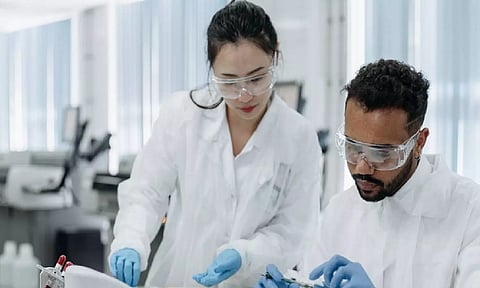

CHENNAI: Cervical cancer is the second most common cancer to affect women in Tamil Nadu, especially in the rural areas.
While the Human Papillomavirus (HPV) vaccine has ordered a hope against cervical cancer, there is a need to encourage more conversations and awareness on the same, say oncologists.
HPV is a common virus, and most sexually active individuals are likely to contract it at some point in their lives. While the body's immune system typically clears the virus naturally, in some cases, it can persist and lead to cervical cancer. January is observed as Cervical cancer awareness month, but the awareness even in Chennai remains low.
A study of awareness on cervical cancer and prevalence of pathological leucorrhoea among women in rural Chennai by Department of Community Medicine of Stanley Medical College and Hospital in 2018, revealed that about 66.8 percent women participants had no awareness on cervical cancer and among the rest, only 27.6 percent had good knowledge and 72.4 percent people had inadequate knowledge on cervical cancer. Thus, there is a need for increased awareness and awareness about vaccination.
The study led by R Tamilarasi as the author, stated that the study shows a large percentage of rural women are completely ignorant about this disease which when detected in early stages is completely curable. Hence, extensive health education to the public is needed to improve their knowledge with an emphasis on the fact that periodic screening is the new standard in prevention of cervical cancer."
The efficacy of the HPV vaccine has been remarkable, with about 90 percent prevention rate. However, there are challenges of lack of awareness, cultural stigmas, cost, and accessibility issues.
"The vaccine should be administered when girls are 12 years of age, and it can be introduced as the last vaccine to be given as part of the Universal Immunisation Schedule. All the physicians need to recommend the vaccine as it can prevent the risk manifold. In schools and colleges, we need to develop the conversation if a girl is vaccinated against cervical cancer or not, similar to other vaccine preventable diseases," said Dr Anitha Ramesh, senior oncologist at Apollo Hospitals.
With the Serum Institute of India is manufacturing Cervavac, India’s first HPV vaccine, the doctors hope that the cost of the vaccines would also reduce.
The known effectiveness of currently available vaccines has made this licensure pathway viable. It is less expensive and time-consuming than the conventional method of proving efficacy against disease in large studies, and it may hasten the approval of other HPV vaccines that are currently under development.
"We hope that HPV vaccine would become a part of the Universal Immunisation Schedule for girls and then it would help us to save thousands of lives. There is not much awareness about it even in urban areas as it is not mandatory. The cost of the vaccine would also reduce as Indian vaccines would be available. Moreover, the integration of the HPV vaccine with existing healthcare services, such as routine check-ups and maternal health programs, can increase its reach and effectiveness," says a consultant oncologist at a government hospital in the city.